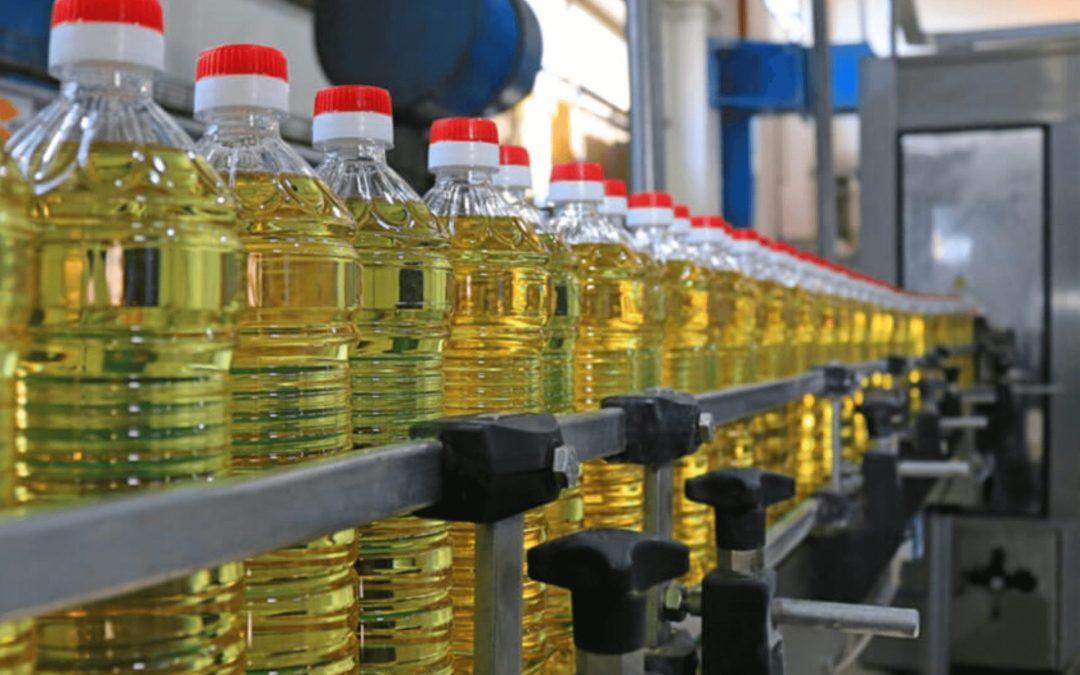If you’re looking for a handy list of seed oils to avoid, look no further, I’ve created this printable infographic you can print out and take with you. Scroll to the end for a printable list you can put on your fridge or take to the grocery store with you.
Sadly, seed oils are quite literally IN EVERYTHING, so you have to read labels like a hawk to avoid them, and even then, cutting them out completely is not realistic. However, this chart will help you know what to look for so you can start!
It’s sad state of affairs that the modern American Western diet is a veritable smorgasbord of toxic ingredients, with many common food additives being banned in Europe for their side effects on human health. Because the Standard American Diet or Western Diet has gotten quite corrupted over the past 100 years, it’s up to us to protect ourselves (contrary to popular belief, the FDA won’t do that for you).
One of the biggest culprits of disease in today’s modern diet is seed oils, which should never have been made for human consumption. Seed oils are the result of modern-day industrial farming and processing. Read below and I’ll share how these inflammatory oils became the standard of the modern American Diet.
Because health is wealth, knowing how to read labels and avoid seed oils can ensure you avoid their toxic side effects which include chronic inflammation which leads to a myriad of diseases. Sure, there's no way to eat totally seed oil free in the modern age, but by knowing what to avoid you can give yourself and your family a good chance at metabolic health. Read to the end I even share how to counteract and mitigate the side effects of seed oils in the diet.
“What are Seed Oils and Why Are they Bad for You?”
Here’s a little history lesson on how seed oils have changed the diet of the Western world for the worse in the past 120 years or so, and in my opinion (and many other doctors and health metabolic health experts- see citations below) one of the main reasons cancer and disease are so common in our times.
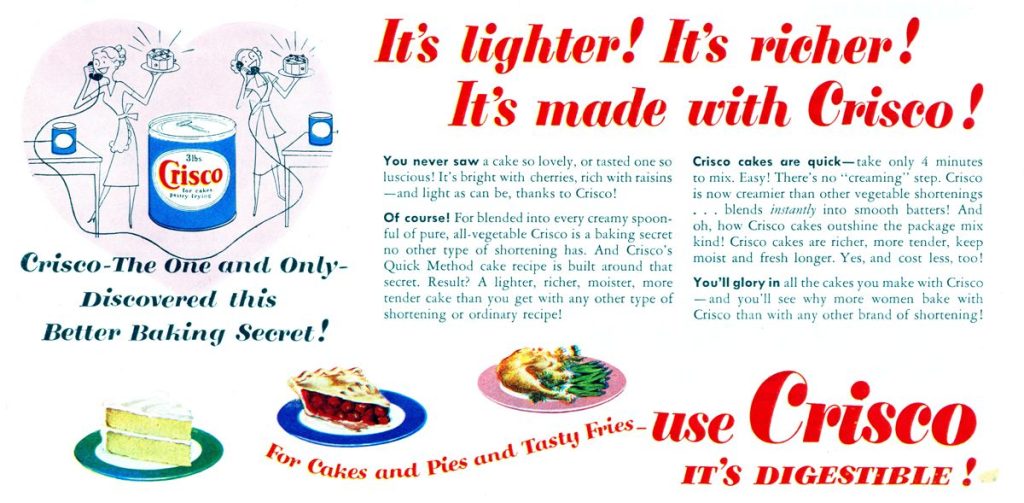
Vintage Crisco Ad
Up until about the early 1900s, animal fats were the norm. To summarize the history of seed oils, innovative entrepreneurs found a way to take oils that were viewed as garbage and repurposed them as cooking oils.
The founding fathers of Procter and Gamble patented a way to repurpose cottonseed oil into a product that resembled cooking lard and called it Crisco. This is how cottonseed oil was turned into hydrogenated vegetable oil, aka Crisco. Then, they created demand for this product via the biggest ad campaign in history, including giving out free cookbooks and samples and generally inundating the public with this new product. This is the history of Procter and Gamble and Crisco. Previously, people cooked in lard, tallow and butter, but thanks to the proliferation of cheaply made seed oils, they took over the Standard American Diet. Crisco is 50% transfat, and according to much research (note sources below), a 2% increase in transfat increase the risk of heart disease by 23%. Mitchell Landon wrote a great summary on the history of seed oils in this article, and the founder of Lifeblud wrote an excellent article on the history of the paint industry and fish and seed oils here. The point is, humans are not meant to be ingesting these oils in our diet but savvy businessmen made this our current reality (and health epidemic).
A Breakdown on Fats: Saturated, Unsaturated, Monounsaturated and Polyunsaturated
Fats are the primary building block of your cell membranes which is why eating the right kinds of fats is really important for your long-term health.
Fats are broken down into two types, based on how many of their carbon bonds are paired with hydrogen: Saturated and Unsaturated. Unsaturated is then further broken down into monounsaturated fats and polyunsaturated fats (PUFAS), depending on how many hydrogen atoms they are missing.
Saturated fats are typically solid at room temperature, behind the scenes they are loaded with carbon atoms forming straight chains. Chain length and hydrogen saturation level are directly correlated to a fat’s melting point, ie, as chain length increases, so does the melting point. Fats like butter and coconut oil have longer chains than fats like olive oil which are liquid at room temperature.
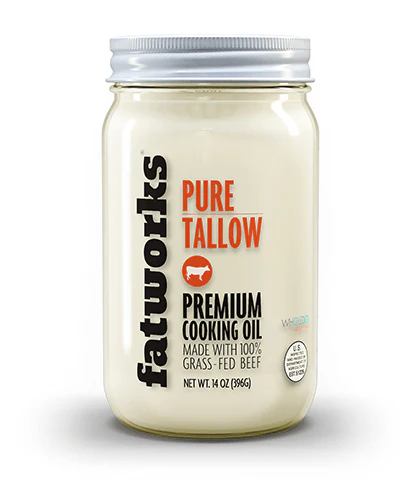
Beef Tallow, a saturated fat, is a healthy cooking fat.
FATS:
SATURATED: typically solid at room temperature (loaded with carbon atoms forming straight chains)
UNSATURATED: Two Types (the more missing pairs of hydrogen pairs that are missing, the molecules occupy more space- this is what makes the fat liquid oil at room temperature.)
- Monounsaturated – okay to ingest
- Polyunsaturated– BAD
Acceptable Saturated Fats:
- Tallow
- Butter
- Ghee
- Lard
- Coconut Oil
Acceptable Unsaturated (MONO) fats:
- *UNREFINED SINGLE ORIGIN Avocado Oil
- *UNREFINED SINGLE ORIGIN Olive Oil
- Goose Fat
- Duck Fat
Refer to Dr Cate’s List of Good Fats vs Bad for an exhaustive list.
Your body is made up of mainly saturated and monounsaturated so that is what it primarily needs as a fuel source. However, the Western diet is loaded in PUFAS, the kind which are inflammatory to the body and lead to chronic inflammation and disease.
List of Top Seed Oils To Avoid
If you right click on the image below, you can save it to your computer and print it out to put on your fridge or take to the grocery store with you. You will be surprised how many seed oils are in everything when you start reading labels. The one that surprises me the most that is in many “healthy foods” is sunflower oil and palm oil.

**Most olive oils and avocado oils have been found to be adulterated, ie, they have seed oils mixed in. Unless you can confirm the origin, it is best to cook with beef tallow or butter versus risking cooking with olive oil or avocado oil that is seed oils with some olive oil or avocado oil mixed in.
Seed Oils are PUFAS, aka the Worst Kind of Fat for your Body
Polyunsaturated fats can be divided into 2 categories, Omega 3 and Omega 6. Our body does need some Omega 3 and 6, but not the quantity found in the modern Western diet. And, as Dr Cate points out the PUFA Project, vegetable oils are not inherently toxic because of the Omega 6, they are toxic because the PUFAS they contain are oxidized.
Linoleic Acid, The Worst of the Worst of PUFAS and Found in Seed Oils
According to Dr Mercola, who wrote a 22 page academic article on the effects of Lineoleic acid, which is found primarily in Omega 6, lineoleic acid needs to be avoided at all costs. He wrote an indepth article on his findings in the Nutrition Journal which can be downloaded here.
“Lowering your LA is the single most important strategy you can take to not only lower reductive stress in your mitochondria, but improve your overall health.” – Dr. Mercola
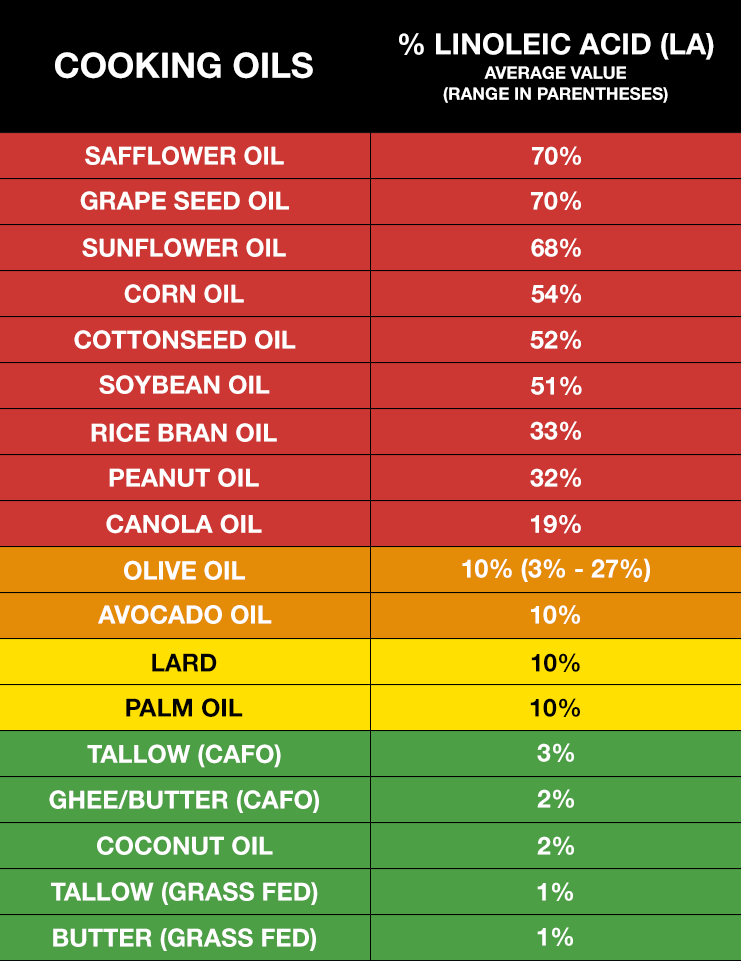
Dr Mercola's research shows that linoleic acid content found in seed oils destroys your mitochondrial function and is the root cause of modern diseases. Source: Mercola.com
Despite What You’ve Been Told, Fish Oil and Omega 3s are Not Your Friend
For many years, we have been getting misguided information that we need to add more Omega 3s (like fish oil and flax seed oil) to our diet to balance out our omega 6 to omega ratio, but this incorrect information. Omega 3s are also PUFAS and need to be avoided. To learn more about the history of Omega 3s and how they came to be in our diet (ie, how flaxseed, linseed oil and fish oil were originally used as paint varnish before being marketed to humans), then check out the excellent article that Adam from Lifeblud Supplements wrote, entitled “Omega 3s are Toxic” which includes a great break down on lipid peroxidation and lipofuscin in the body. Ie, when we consume PUFAs, we develop lipofuscin, the “liver spots” we see on our arms. This is a direct result of lipid peroxidation, which is the oxidation, or the rancidification of a fatty acid, when it is exposed to oxygen, heat, and/or light, ie what happens when PUFAs are exposed to the human body.
What Can You Do to Counter all the Seed Oils in our Diet?
We can avoid seed oils like the plague but let’s face it, there’s no way to completely eliminate seed oils. What I’ve found is that cutting out processed foods and eating clean meat is the best way to rid my diet of these metabolism wreckers. However, let’s be real, there’s no way to eat that way 100% of the time, and anytime I eat at a restaurant I’m most likely ingesting seed oils. (FYI, there is a great app called Seed Oil Scout, that shows restaurants in your area that don't cook with seed oils!)
Vitamin E- The Antidote to Seed Oils and Oxidative Stress
The research of Dr. Ray Peat has shown that Vitamin E is a great antidote to the deluge of seed oils in our diet. I started working with a Metabolic Health Doctor who advised I start taking Vitamin E on a daily basis and now I realize why- it protects your body from the oxidative damage that PUFAs inflict on your body. Here is how it works, taken from the “Why take Vitamin E” blog:
- Lowers excess estrogen: Vitamin E helps regulate estrogen levels in the body, preventing hormonal imbalances.
- Decreases oxidative stress: By neutralizing free radicals, Vitamin E reduces oxidative stress and protects cells from damage.
- Prevents lipid peroxidation: Vitamin E prevents the oxidation of fats in the body.
- Decreases and reverses markers of biological aging: Vitamin E helps combat age-related skin issues like age spots, wrinkles, and skin discolouration.
- Protects from cell damage: The antioxidant properties of Vitamin E protect cells from damage caused by environmental factors and toxins.
- Helps cells utilize oxygen and create energy more efficiently: Vitamin E improves cellular respiration, enhancing energy production.
- Protects from damage caused by high PUFA foods: Vitamin E counteracts the harmful effects of polyunsaturated fatty acids (PUFAs) found in fried foods and seed oils.
- Improves insulin resistance: Vitamin E plays a role in improving insulin sensitivity.
- Supports fertility: Vitamin E is essential for reproductive health and can improve fertility in both men and women.
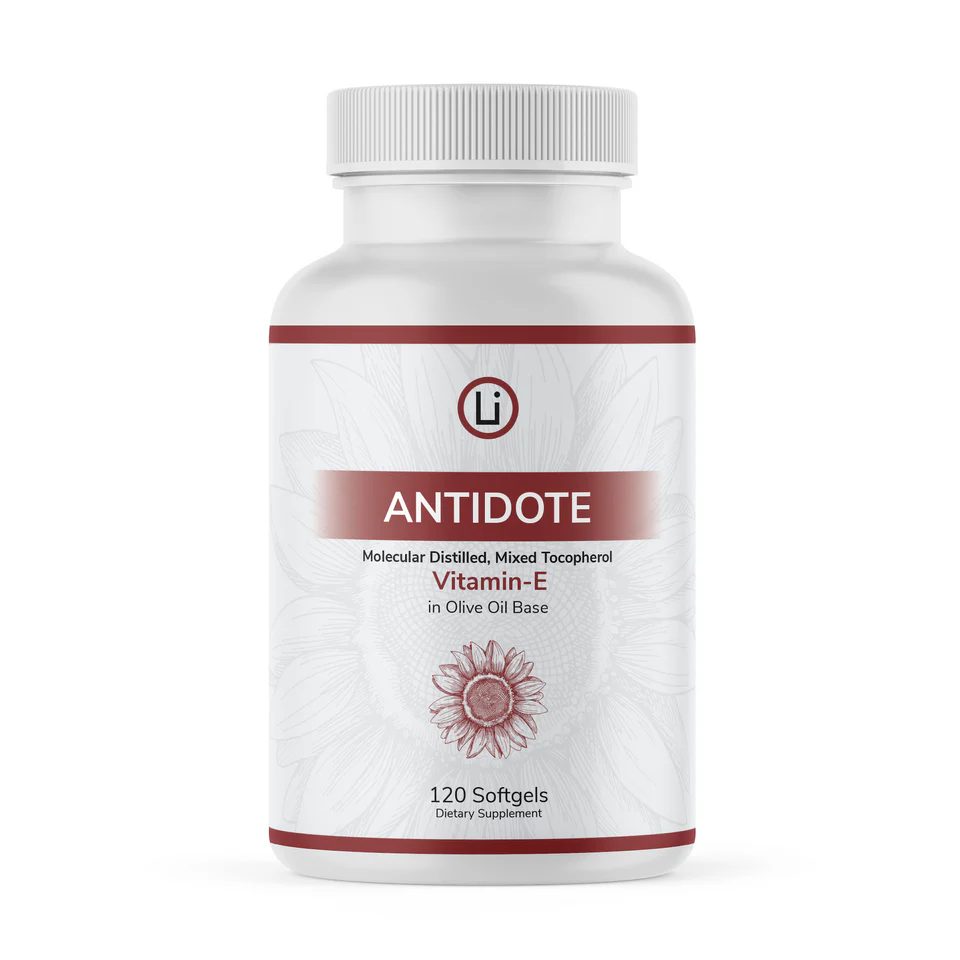
Vitamin E helps counter the damage done by the daily deluge of seed oils in the American Diet. Make sure you don't buy Vitamin E in sunflower oil- which is a seed oil!
BEWARE: Many Vitamin E suppliers offer their Vitamin E in sunflower oil, which is a seed oil!
If you are looking for a clean seed oil from a trustworthy source, I recommend Lifeblood Antidote – use code GRILLGIRL for 10% off. I take one a day to counter the daily deluge of toxins we are exposed to. This is an affiliate link, I will make a small commission- but trust me when I tell you I have vetted this company! I appreciate the supplements they offer with no fillers and the research they provide. I only recommend products I personally use and endorse.
NOTES ON THE INFORMATION ABOVE: I am NOT a doctor, this is information I have learned from scouring the research of highly respected Doctors: Dr Mercola, Dr Cate and Dr Ray Peat. References to my findings are below. What I've found is that not all seed oils are bad because of the Omega 6, it is because of the methodology for making them which includes using chemicals like hexane for extracting and processing them AND because they are oxidized and rancid when we consume them which is highly toxic to our bodies. As a general rule, animal fats are the best because they are the least processed of all the fats, even olive oil, avocado oil and coconut oil go through some refinement processes which makes them less healthy. Avocado oil and olive oil are often adulterated and mixed with seed oils so beef tallow is my preferred cooking fat at home.
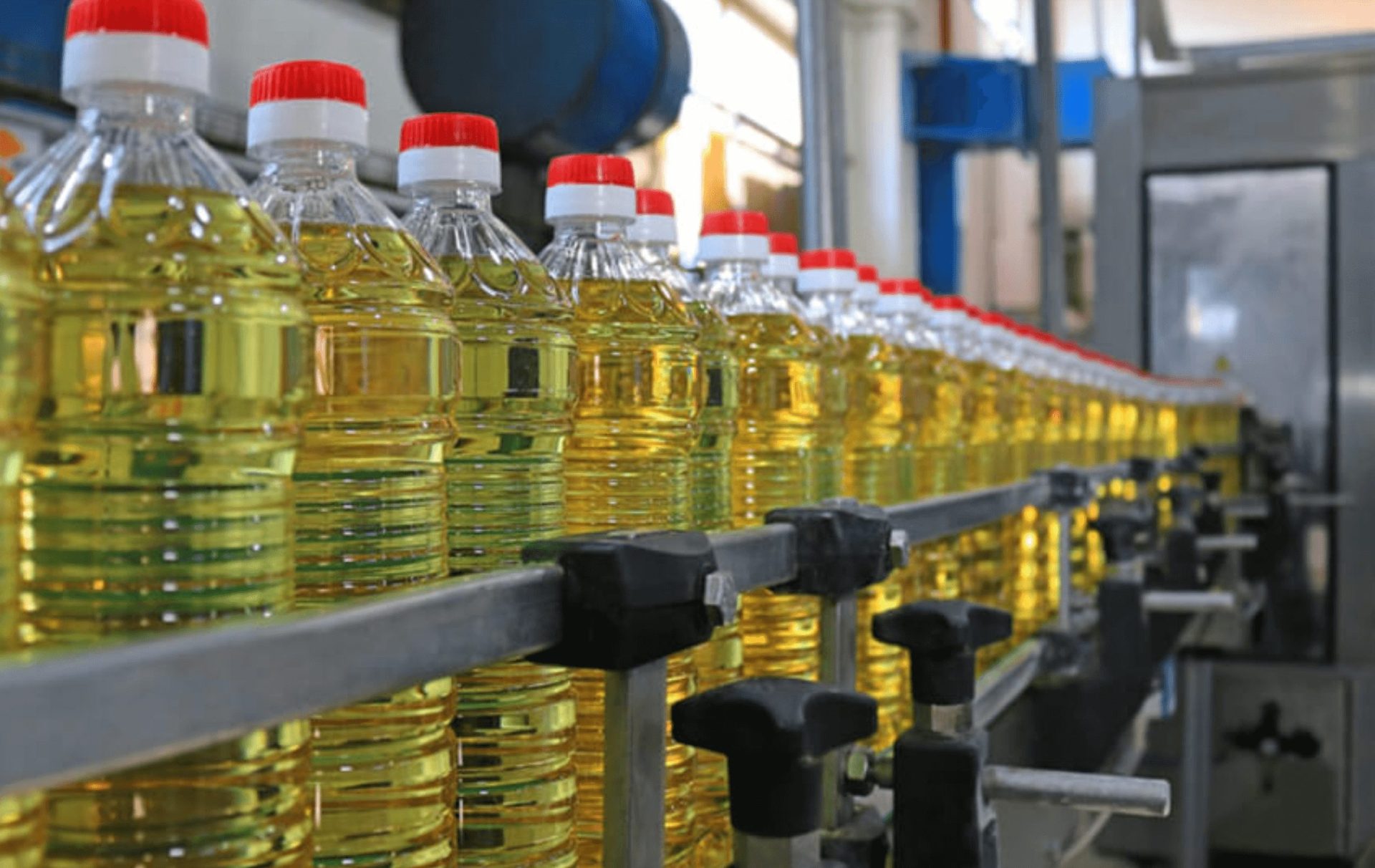
List of Seed Oils to Avoid
 Seed oils are not your friends and cause major longterm damage to the body. Use the list below to know the seed oils to avoid and which fats and oils are preferred for cooking with.
Seed oils are not your friends and cause major longterm damage to the body. Use the list below to know the seed oils to avoid and which fats and oils are preferred for cooking with.Ingredients
LIST OF SEED OILS TO AVOID:
- CANOLA OIL
- SOYBEAN OIL OFTEN CALLED VEGETABLE OIL
- CORN OIL
- COTTONSEED OIL
- VEGETABLE OIL
- HYDROGENATED OIL
- PARTIALLY HYDROGENATED OILS
- REFINED PALM OIL
- SAFFLOWER OIL
- RICEBRAN OIL
- GRAPESEED OIL
SAFE COOKING OILS
- BEEF TALLOW
- COCONUT OIL
- LARD
- BUTTER
- GHEE
- **OLIVE OIL
- **AVOCADO OIL
- ** Look for single origin unadulterated OLIVE and Avocado Oils. Most Olive and Avocado oils have been mixed with seed oils.
Sources:
https://mitchelllandon.com/seed-oils/ https://www.theatlantic.com/health/archive/2012/04/how-vegetable-oils-replaced-animal-fats-in-the-american-diet/256155/
https://articles.mercola.com/sites/articles/archive/2023/07/17/linoleic-acid.aspx
https://drcate.com/the-hateful-eight-enemy-fats-that-destroy-your-health/
https://drcate.com/pufa-project/

